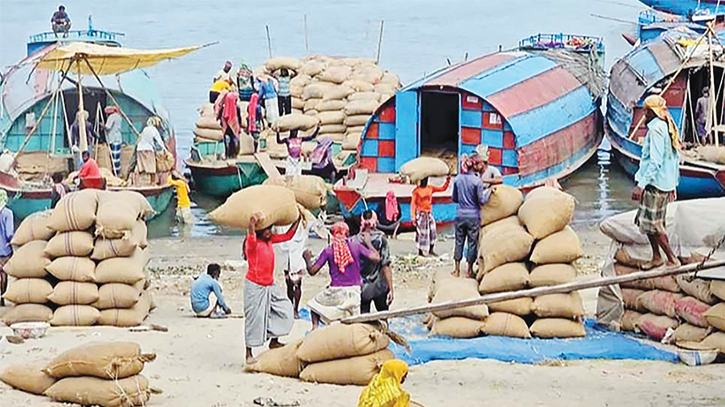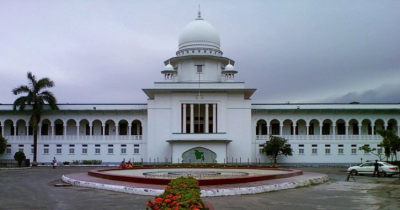
Photo : Messenger
The bustling paddy trade hub of Ashuganj in Brahmanbaria, known for its substantial daily transactions of paddy from multiple districts, faces a significant downturn this year.
Typically, an average of one lakh maunds of paddy is supplied daily to 250 farms in Brahmanbaria from Sunamganj, Kishoreganj, Sylhet, and Habiganj. However, the ongoing season has seen a drastic drop in sales, plummeting by at least 80 percent.
Despite ample paddy stocks in warehouses, the daily sales have shrunk to a mere 15 to 20 thousand maunds. The dwindling sales are attributed to multifaceted concerns plaguing both farmers and traders. Political uncertainties surrounding the elections have deterred wholesalers from procuring rice. Additionally, the government's open-market sale of rice has contributed to reduced demand in the market.
A notable decline in rice sales, which typically amounted to around 10 to 12 crores daily in Dhaka, Chattogram, and Sylhet regions sourced from approximately 250 rice mills in Brahmanbaria, has been observed since late November.
Wholesalers' apprehensions amid political volatility have triggered a significant drop in rice transactions, from a daily turnover of 12 crores to a mere 2 crores.
This plunge in trade has raised concerns among paddy owners, leading to decreased paddy purchases. Traders fear potential losses due to the stagnant rice sales.
Expressing the challenges faced, Abu Hanif, a rice trader from Sunamganj's Dirai, emphasized the substantial financial losses, citing a projected loss of Tk 100 per maund of rice. This dire situation has led traders to consider refraining from purchasing paddy, ultimately impacting the livelihoods of farmers.
Mohammad Kamal, another paddy trader from Sunamganj, shed light on the financial strain encountered in transporting paddy from farmers' homes to Mokam. The increased costs in logistics, along with plummeting selling prices of paddy, have forced traders into selling rice at a loss. This unfavorable scenario has disrupted the usual vibrant trading scenario at the Mokam, situated along the banks of the Meghna River in Ashuganj, which historically served as the largest trading center in the eastern region, with an average sale of 100,000 maunds of paddy during the season.
The rice scarcity that persisted for approximately four months in Mokam due to a diminished supply created a crisis. However, the situation witnessed a shift towards the end of November as fresh paddy cultivation commenced. Presently, a variety of paddy, including BR-29, Hira, BR-39, and BR-49, are available in Mokam. This influx of new paddy has considerably alleviated the prior rice crisis. The market now showcases BR-29 being traded at Tk 1230–1240 per maund, Hira paddy at Tk 1150–1160 per maund in Ashuganj, BR-39 at Tk 800–900, and BR-49 at Tk 1000–1050.
Despite the rice market stabilization, rice mill owners are displaying reluctance in purchasing paddy from Mokam. Their decreased involvement is attributed to the reduced purchase and sale of rice in the broader market. Presently, daily paddy transactions in Mokam stand at 15-20 thousand maunds, marking an 80 percent decline compared to previous seasons.
Rice coal owners express concerns regarding the burgeoning political instability since the announcement of the election schedule, adversely affecting the rice market. Wholesalers from Dhaka, Chattogram, and Sylhet regions, who were traditional buyers from Brahmanbaria, are refraining from purchasing rice. Consequently, a surplus of unsold rice persists among most farmers.
Ubaidullah, former general secretary of the Brahmanbaria District Rice Mill Owners Association, highlighted the lack of coordination within the rice market, contributing to a surplus of unsold rice across mills due to decreased sales. The ongoing disruptions like hartals and blockades, compounded by the government's open-market sale of rice, have further dampened market sales.
Expressing the prevailing sentiment among wholesalers, Ubaidullah remarked on their apprehension regarding the political climate surrounding the elections, leading them to abstain from rice procurement. Consequently, reduced rice purchases from Mokam ensued. However, there remains optimism that if the political situation stabilizes post-election, the rice market may return to normalcy.
Messenger/Fameema








